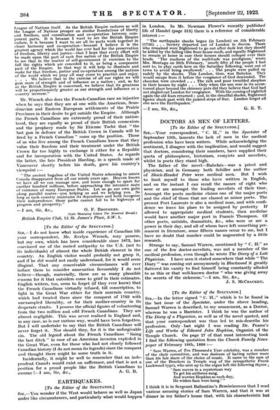DOCTORS AS MEN OF LETTERS.
[To the Editor of the SPECTATOR.] Sni,—Your correspondent, " C. H.," in the Spectator of September 15th, laments the lack of men in the medical profession who have been writers. While acknowledging the sentiment, I disagree with the implication, and would suggest that doctors, considering their numbers, have supplied their quota of philosophers, historians, essayists and novelists, whilst in poets they stand high.
The father of the novel—Rabelais—was a priest and physician; and in Germany both Schiller and the author of Shock-Headed Peter were medical men. But I wish to limit myself to those who have written in English, and on the instant I can recall the names of eight who were or are amongst the leading novelists of their time.
Amongst the poets medicine claims one of the major poets and the chief of those that are classed as minor poets. The present Poet Laureate is also a medical man, and with confi- dence we leave his place to be assigned by posterity If allowed to appropriate medical students, then medicine would have another major poet in Francis Thompson. Of other poets, satirists, dramatists, &c., who were or are a power in their day, and all of whom have left something per- manent in literature, some fifteen names occur to me, but I have no doubt that number could be augmented by a little research.
Strange to say, Samuel Warren, mentioned by " C. H." as one of the few doctor-novelists, was not a member of the medical profession, even though he wrote The Diary of a Late Physician. I have seen it stated somewhere that while " The Diary " was coming out anonymously in Black-wood it greatly flattered his vanity to find himself being constantly alluded to as this or that well-known doctor " who was giving away the secrets of the sickroom."—I am, Sir, &c., J. S. MCCRACKEN.






































 Previous page
Previous page